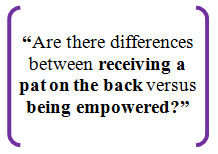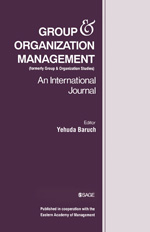Employee Proactivity: How Social Support Matters
Editor’s note: We are pleased to welcome Dan S. Chiaburu of Texas A&M University, whose article “Employees’ Social Context and Change-Oriented Citizenship: A Meta-Analysis of Leader, Coworker, and Organizational Influences,” co-authored by Natalia M. Lorinkova of Wayne State University and Linn Van Dyne of Michigan State University, is forthcoming in Group & Organization Management and now available in the journal’s OnlineFirst section.
 Change-oriented behaviors – such as streamlining suboptimal procedures and providing suggestions at work – can ruffle some feathers among leaders or peers. We examined if and to what extent supportive features of the social context (from the organization, leader, and coworkers) are predictive of employees’ change-oriented behaviors. To capture a wide range of respondents and work settings, we used meta-analysis. We also investigated to what extent specific (vs. generic) actions from employees’ social environment are differentially predictive. Are there differences between receiving a pat on the back (a generic supportive action) versus being empowered (a more targeted one) from the supervisor?
Change-oriented behaviors – such as streamlining suboptimal procedures and providing suggestions at work – can ruffle some feathers among leaders or peers. We examined if and to what extent supportive features of the social context (from the organization, leader, and coworkers) are predictive of employees’ change-oriented behaviors. To capture a wide range of respondents and work settings, we used meta-analysis. We also investigated to what extent specific (vs. generic) actions from employees’ social environment are differentially predictive. Are there differences between receiving a pat on the back (a generic supportive action) versus being empowered (a more targeted one) from the supervisor?
 Surprisingly, generic and specific leader actions positively predicted subordinate change-oriented behaviors to roughly the same extent. This is inconsistent with current recommendations that leaders should engage in change-oriented actions if they want change from their employees. Even though our study is based on correlational data, it highlights an interesting pattern, and should stimulate additional research. We were also surprised to see that, even when accounting for their inter-correlations, support from the organization, leader, and colleagues mattered to the about same extent for employee proactivity.
Surprisingly, generic and specific leader actions positively predicted subordinate change-oriented behaviors to roughly the same extent. This is inconsistent with current recommendations that leaders should engage in change-oriented actions if they want change from their employees. Even though our study is based on correlational data, it highlights an interesting pattern, and should stimulate additional research. We were also surprised to see that, even when accounting for their inter-correlations, support from the organization, leader, and colleagues mattered to the about same extent for employee proactivity.
There are multiple possible extensions to this study, such as focusing on a more encompassing set of outcomes, including employee task performance and traditional forms of (affiliative or prosocial) citizenship. But we also hope to see more work toward better specified models and stringent research designs (e.g., experiments). “Head-to-head” examination of competitive models and controlled designs can disentangle heretofore confounded aspects.
Read the paper, “Employees’ Social Context and Change-Oriented Citizenship: A Meta-Analysis of Leader, Coworker, and Organizational Influences,” in Group & Organization Management.
Dan S. Chiaburu is Assistant Professor of Management in the Mays Business School at Texas A&M University. His current research examines prosocial and proactive work behaviors, and coworker exchanges. His recent work appeared or is in press at the Journal of Applied Psychology, Journal of Management, Journal of Personnel Psychology and Personnel Psychology.































































































